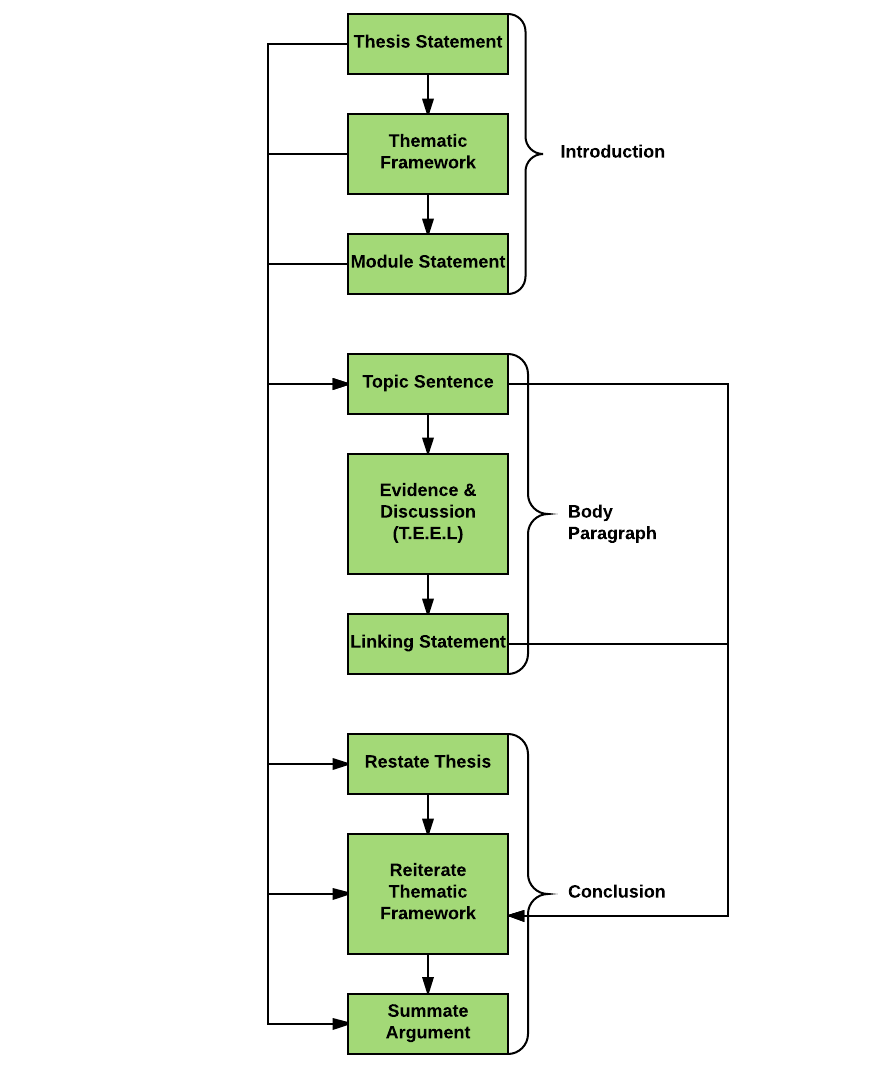
In Part 1 of our popular Essay Writing Series, we teach you how to write a perfect thesis statement, updated in 2022.

This post, How to Write a Thesis Statement, is the first post in our 5 part Essay Writing Series. In this series, we will break essay writing into a series of parts and solve some commonly asked questions to give you the tools to write consistent essays.
Some common questions about essay structure are:
In this post, we’ll give you an overview of essay structure and explain why a thesis statement is important for your essay. We’ll then give you a step-by-step guide for writing a Band 6 thesis.
Learning how to write a good essay is something developed through practice and logic, not innate skill or talent. Anybody can write a good essay with practice and instruction.
In this series of posts, we will show you some of the skills that Matrix students use as they learn to write Band 6 responses. First, we will learn about the structure of an essay, and then we will look at why the thesis is the solid foundation on which we build our argument.
Essay structure is the logical sequencing of information we use when composing a written argument. When you break it down, essay writing is actually a fairly straightforward process.
When you break essay writing down into a process, it becomes straightforward and systematic.
We can take the process of essay writing and look at it in a diagram:

In this post, we will look at the first step of this process. The thesis statement.
Let’s have a look at what it does.
Develop essay writing confidence before the HSC exams with our Year 12 English Matrix Course! Learn more.
Start HSC English confidently
Expert teachers, detailed feedback, one-to-one help! Learn from home with Matrix+ Online English courses.
The thesis is the foundation of your essay. It structures your argument. Having a good thesis is essential to getting a Band 6 result, regardless of what module or level of English you are doing.
Your thesis needs to be concise, but also answer the question. It must introduce an idea that you can readily repeat throughout your essay so that your reader is constantly aware of what you are arguing.
Now we know what a thesis is and how it functions within an essay, let’s look at a step-by-step process for writing one!
We’ll now look at the process for writing a thesis statement. To do so, we will use a HSC question as an example and develop it throughout this series.
You need to properly address the question to score a Band 6. Underlining key words in the question will take less than a minute and give your essay clear direction.
Let’s look at how we would annotate the 2021 HSC question for the Common Module:
Analyse how your prescribed text represents the ways individuals respond to the challenges they face.
Now that you know the key points that the question wants you to discuss, you can jot down relevant topics/themes from your prescribed you’d want to discuss in your essay.
| Key word | Topics/themes |
| represents | dystopian novel, third person limited narration, placid tone, symbols/motifs including diary, coral paperweight, 2+2=5, Big Brother |
| individuals | Winston, Julia, O’Brien, Katharine, Parsons family, woman with sandy hair |
| challenges | strict freedom-less political regime, threat of persecution, lack of companionship, no self-expression or individual identity |
| responses | blindly conform to social pressures, genuinely support the regime, don’t trust anyone, try or at least hope that it’s possible to overturn the strict political regime, risk persecution to enjoy immediate personal gratification, openly or covertly rebel |
Your argument is essentially your super passionate response to the question. It’s subjective and opinionated, which is why you need a whole essay to try to convince your marker that you are right.
You don’t have to use fancy wording to get your point across. Write it how you would say it in a conversation; this step is for you to know what you are going to spend the next 40 minutes writing furiously about.
Be strategic about it. Pick a stance that:
You don’t necessarily have to personally believe that your argument is true. You can play devil’s advocate or be overly pessimistic if you think that’s the easiest route to take.
Here’s an example of an argument that you can make in response to the 2021 HSC Common Module question:
“Even though everyone responds to challenges in different ways, at the end of the day, we all selfishly prioritise our own needs and safety before anyone else.”
It’s a very drastic and upsetting thing to believe, but you can see how we could effectively use evidence from Nineteen Eighty-Four to prove it.
Now that you know exactly what your overarching argument is going to be, you can write a thesis statement from that. To turn your argument into a thesis statement, you need to:
| Argument from Step 3 | Thesis Statement |
| Even though everyone responds to challenges in different ways, at the end of the day, we all selfishly prioritise our own needs and safety before anyone else. | Individuals respond to the social challenges of an oppressive regime differently, but they all inherently prioritise self-preservation. |
Don’t write the 94851 th essay that your marker has to read with these mistakes.
The most common error when composing thesis statements is repeating the question.
As senior students, you are expected to analyse the question and construct a personal and logical response to it. Repeating the question back at the marker as a thesis statement does not demonstrate an understanding of the question, module, or text. Instead, such a response demonstrates that you have a limited understanding of both.
Let’s look at the 2021 HSC question for Module A:
How do the extracts provided contribute to a broader textual conversation between the pair of prescribed texts that you have studied in Module A?
You can find the extracts the question refers to here.
We’ve written examples for the prescribed texts The Tempest and Hag-Seed.
| Common but weak thesis | Strong thesis |
| William Shakespeare’s The Tempest and Margaret Atwood’s Hag-Seed engage in a textual conversation as shown in the extracts provided. |
Don’t be vague or use low modality words and expressions in your thesis.
Students have it drilled into them that “they know nothing” or “don’t have the experience” to say things with certainty. This is said to stop students making broad sweeping statements about human existence or genres of writing, but it must not apply to your understanding of the text.
Let’s have a look at the 2020 HSC Module A question to see what we mean:
In textual conversations, the later text is often seen as a shadow, lacking the originality and power of the earlier.
To what extent is this statement true of the two prescribed texts you have studied in Module A?
A common thesis mistake was to state something along the lines of:
“Margaret Edson’s play ‘W;t’ (1995) may appear to merely echo the concepts John Donne explores in his poems. However, her play could be also seen as nuanced commentary of Donne’s poetry that creates a highly engaging textual conversation about the death, separation and salvation of one’s physical and mental being.”
This statement uses the verb “could” which lacks certainty. You want to avoid verbs like “may,” “might,” or “could” , or replace them with verbs like “will,” “does,” and “shall” that have high-modality or high certainty.
People are more inclined to give credibility to assertive and confident voices. This is why the following thesis statement sounds so authoritative:
“It would be grossly unfair to say that Margaret Edson’s later play ‘W;t’ (1995) merely echoes the concepts that John Donne explores in his poems. In fact, Edson’s nuanced commentary of Donne’s poetry creates a highly engaging textual conversation about the death, separation and salvation of one’s physical and mental being.”
The term thesis statement can be misleading. We hear “statement” and we often think “sentence.” The two words are not synonymous, though. It is far better to use an extra sentence to add detail to your sentence rather than stubbornly pack it into one. You need to explain the logic of your argument in a thesis, not just outline an argument.
Compare these two thesis statements:
“The storytelling of narratives that have been denied or repressed leads individuals to reconsider their knowledge of things.”
“The storytelling of narratives that have been denied or repressed profoundly impacts an individual’s perspective of society. The process of uncovering these stories compels individuals to reassess the political regime they live in and adjust their understanding of truth in their world.”
The second thesis is obviously better, but why?
The first thesis statement is competent, but it does not help the marker into your understanding of the module or the question. By splitting the statement over two sentences in the second example, we detail the logic of our argument. The second statement explains how the process of storytelling works, rather than merely noting that it occurs.

Too often students will write the thesis they have prepared and not the one that responds to the question they have been given. This is common amongst students who prefer to write “generic” essays and “mould” them to suit a question.
Let’s consider the 2021 HSC question for Module B:
‘Literature forces us to ask questions and look for answers. Even if those answers do not exist.’
To what extent is this true?
In your response, make close reference to your prescribed text.
One of the key things to note is that this question asks you ‘ To what extent is this [statement] true’. You can answer that in a range of ways:
| Stance | What does this mean for your thesis statement and essay? |
| Your prescribed text forces you to ask questions and look for their answers, regardless of whether these answers exist. | You will need to provide evidence from your prescribed text that shows that it: |
| Stance | What does this mean for your thesis statement and essay? |
| Your prescribed text doesn’t make you ask questions or look for answers. | You will need to provide evidence from your prescribed text that shows that it does not make you question anything or feel the need to resolve anything. |
| Stance | What does this mean for your thesis statement and essay? |
| The question consists of 4 key statements that you have to determine whether they are true or not: |
In an exam, you usually won’t have enough time to write out all the different stances you could make to address the question. However, at the very least, you should dedicate a minute to annotating parts of the question that you agree and disagree with, and think about how you can use the evidence you remember to support your thesis.
You have already got off to a good start by going through these steps to writing a thesis statement. From here, it’s all about practice and making sure you don’t let down your fabulous thesis statement with the rest of your essay.
Essay writing is a skill that develops the same way as juggling a soccer ball or playing the panpipes. You will not become adept unless you invest many hours writing and rewriting responses to a variety of questions.
If you want to learn how to produce that killer thesis go to the NESA website and work your way through their practice questions until you’re an expert.
Now you’ve got a thesis, you need to use it to structure an essay. The next step is to choose the themes that you will discuss and introduce them to your reader.